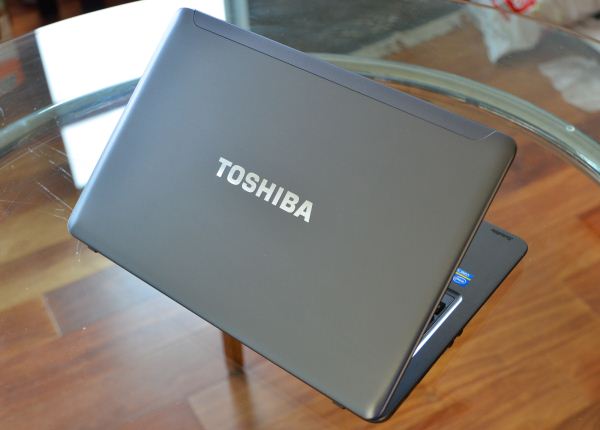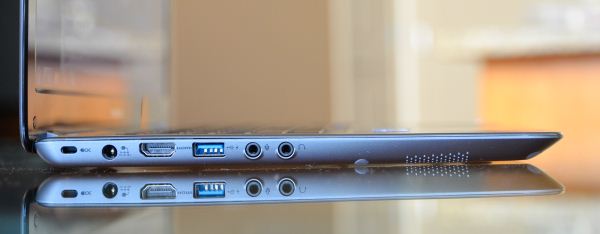Toshiba Satellite U845: Ultrabooks Go Mainstream
by Vivek Gowri on October 8, 2012 5:00 PM EST- Posted in
- Laptops
- Intel
- Toshiba
- Ivy Bridge
- Ultrabook
At CES, Toshiba showed us its forthcoming 14” Ultrabook, a system that they said would debut alongside Ivy Bridge in Q3. At the time, it was overshadowed by their new tablets (which hit the market as the Excite series), but true to their word, Toshiba dropped off their new 14” Satellite U845 Ultrabook in our labs and gave us a chance to take a look at it. It’s one of the new “budget” Ultrabooks, which hit the low end of Intel’s Ultrabook spec for around $800, with designs that are still very thin and light but typically not as premium as class headliners like the Samsung Series 9 and ASUS Zenbook Prime. It’s a breed that includes the Samsung Series 5 Ultra, HP’s new Envy 4t and 6t Ultrabooks, the Sony VAIO T13, and Lenovo’s U310/410.
| Toshiba Satellite U845-S406 Specifications | |
| Processor |
Intel Core i5-3317U (2x1.7GHz + HTT, Turbo to 2.6GHz, 22nm, 3MB L3, 17W) |
| Chipset | Intel HM77 |
| Memory | 6GB (4GB + 2GB) DDR3-1600 (Maximum 8GB) |
| Graphics |
Intel HD 4000 Graphics (16 EUs, up to 1.05GHz) |
| Display |
14.0" LED Glossy 16:9 768p LG Display LGD033F |
| Hard Drive(s) |
500GB 5400RPM HDD (Hitachi HTS54505) 32GB mSATA caching drive (Intel Smart Response Technology) |
| Optical Drive | - |
| Networking |
Intel Centrino Wireless-N 2230 2.4GHz 802.11b/g/n Bluetooth 4.0+HS Atheros AR8152 10/100 Ethernet |
| Audio |
Realtek ALC269 HD audio Stereo speakers Headphone/mic combo jack |
| Battery | 6-Cell, 54Wh |
| Front Side | - |
| Right Side |
SD/MMC card reader 2 x USB 2.0 Ethernet 10/100 |
| Left Side |
Kensington Lock Power/AC Adaptor HDMI USB 3.0 Line-in/microphone jack 3.5mm headphone jack |
| Back Side | - |
| Operating System | Windows 7 Home Premium 64-bit SP1 |
| Dimensions |
13.4" x 9.1" x 0.79" 340.4mm x 231.1mm x 20.1mm |
| Weight |
3.90 lbs 1.77 kg |
| Extras | VGA webcam |
| Warranty | 1-year limited international |
| Pricing | $879 MSRP, Online starting at $600 |
The U845 follows the usual pattern here, with Ivy Bridge ULV processors, a mechanical hard drive paired with an SSD cache, Intel’s onboard graphics, a ho-hum 14” 1366x768 display, and a 3.9lb/0.8” thick form factor. With an MSRP starting price of $749 (our evaluation unit goes for $879), it’s a pretty good representative of the budget Ultrabook market, essentially matching the price and specsheets of the competing Series 5 Ultra and Envy 4t. Of course, that's assuming you have to pay MSRP, and right now the U845 is going for much less than $879: $600 (plus tax) for the i5-3317U equipped version. How's that for a discount?
You get a so-so collection of ports, with HDMI, a single USB 3.0 port, two USB 2.0 ports, and a 10/100 Ethernet jack. At nearly $900 the lack of Gigabit LAN is rather sad; I’d have liked to see Toshiba go with GigE and a second USB3 port. I suppose that it’s not all that common for Ultrabooks to have Ethernet connections anymore, so maybe we should just be thankful for what we were given. As noted above, however, $600 is far more pallatable for such hardware and we're willing to forgive the omissions.
There are three SKUs for the U845, and all of them look pretty similar. The base model U845-S402 comes with an SNB i3-2377M, 4GB memory, and 16GB SSD cache in addition to the 500GB spindle, with an MSRP of $749. Office Depot lists it at $449 with a current $300 discount, however that doesn't show up as being available for purchase right now; B&H has it going for $625. The lack of Turbo on the i3 line plus the use a a previous generation SNB CPU (and HD 3000 graphics) makes the 2377M’s 1.5GHz clock speed look painfully low, so I’d recommend avoiding it. The mid-level U845-S404 model adds $100 to the MSRP and bumps it to the i5-3317M (1.7GHz, with a max Turbo of 2.6GHz), but it's currently the most expensive of the three models at $700 online, so there's no reason to even look at it. Our top shelf U845-S406 model has the same CPU but with a 32GB SSD cache and 6GB RAM, with online pricing starting at $600 at Office Depot, or $680 at B&H.
Before we even get to the performance, it's worth a short tangent to note the drastic price cuts seen on Toshiba's entire U845 line—and such cuts aren't limited to Toshiba Ultrabooks. A quick search on Newegg turns up nine Core i5 Ivy Bridge Ultrabooks priced under $800, with the cheapest Lenovo U310 going for $600. Intel had big plans for Ultrabooks when they first hit the scene last year, but they're not selling all that well with pricing closer to $1000. It's not clear if Intel is helping to reduce the pricing by dropping CPU costs or with other incentives, or if the manufacturers are just trying to move inventory, but $600 is a far more realistic starting point. The U845 we have now hits that same mark, so let's see how it performs along with a subjective evaluation.












57 Comments
View All Comments
ccd - Monday, October 8, 2012 - link
If I want to consume media, I'm getting a tablet. If I want a machine to do office work, I need at least 15" screen which would also include a decent sized keyboard. Anything below 15", ultrabook or not, will soon become some form of tablet.teiglin - Monday, October 8, 2012 - link
Strongly disagree. For casual browsing on the couch, I much prefer a laptop to a tablet. From the options of an iPad, a Galaxy Tab 7.7, and an 11" Samsung Series 9, the Series 9 sees by far the most couch use.For "media consumption" (which is a pretty ambiguous term, but which I take to mean "watching TV shows/movies), a tablet may or may not be better--of course, on the couch, I generally use the TV, and when travelling, an ARM tablet tends to have the advantage thanks to battery life.
Personally, I tend to agree that the 13-14" form factors that seem to be the most common laptop screen sizes nowadays are not ideal; for me, 11" is more comfortable to use while lounging, and certainly stepping up in size gives you a more usable keyboard, but for any work involving actual typing, I find it hard to use any laptop keyboard at all--although I've never had a job that involved a lot of travel and typing concurrently, so I guess if you don't have the luxury of a real keyboard, it's just a matter of how much size you're willing to sacrifice to ease the weight of your carry-on.
Belard - Tuesday, October 9, 2012 - link
Dunno about you but, I'm on my iPad now.... Went from couch to toilet to bed... As Steve Jobs envisioned. My desktop is a few feet with a nice 24" display... But I'll type small messages like this on the tablet.You cannot hold a notebook like a book. You cannot share info on a notebook like you can on a tablet... As nAturally.
Different people like different things, each their own. I do use a tablet a bit more than my notebook, but desktop wins.
SodaAnt - Monday, October 8, 2012 - link
I disagree for a few reasons here. I think there's still plenty of space for a 11-13" ultrabook for on the go work. I can't do decent typing on a tablet, and unless I'm hauling around a lot, I'd rather not carry a 15" laptop. However, a light 11" ultrabook is perfectly fine for typing and writing up documents, and is also good for media consumption too.rwei - Tuesday, October 9, 2012 - link
Agree with this, and I've been flip-flopping. My 'portable' toolkit currently consists of an iPad 3 and a Thinkpad x120e.iPad is nice because the screen is purrty, and it barely weighs more than 1lb (don't need charger for anything up to a 2-day trip). Notable downsides include feeling like a tool.
However, the Thinkpad is nice because of the keyboard, being a real computer (full Office suite, MusicMonkey, browser), and (ironically, seeing as the iPad is the media device) of being more convenient for watching movies and music, since I don't have to convert everything (e.g. FLAC) and/or manage to a 32GB capacity. Then again, icky screen and >3x the weight w/ charger (5-6hr life isn't enough).
I'm always torn between which to bring. Bringing both would obviously be dumb.
Hopefully this resolves itself once Windows 8 hybrids launch and mature, to get me all the best functionality aspects of the Thinkpad in a more iPad-like package.
kaalus - Monday, October 8, 2012 - link
Must be a joke. Please stop even reviewing this crap. When someone soiled their pants there's no point looking in there.Conficio - Monday, October 8, 2012 - link
So many people don't need thin and don't need light. Especially not when you buy on a budget anyway. What users need and want is good screen, sturdy chasis with a keyboard with little/no flex, good trackpad.Even a good venting system that does not need cleaning every 6 mo or a hinge that survives more than 12 mo of light use, is more important than slim and light.
And in a 15" laptop add two 2.5" drive bays!
Conficio - Monday, October 8, 2012 - link
Actually meant to add, I'm not surprised they are not selling that well.Bob Todd - Monday, October 8, 2012 - link
The same thing passes through my mind on almost every Ultrabook review. Up at the ~$1000 range, these things are competing with higher end Windows laptops with quad core regular voltage CPUs, 8GB of RAM, dedicated GPUs, good build quality, and possibly an IPS panel or really strong TN (up to 1080p). And sadly the "regular" laptops that draw a lot more power aren't suffering in battery life since these Ultrabooks usually have freaking tiny batteries. Most of these haven't been good enough to be my only laptop, so I'll trade a little thinness and weight for a better overall package (e.g. Lenovo X230 all the way up to an Envy 15).10/100 Ethernet is a joke and these companies should be ashamed. Gigabit can't add much to the BOM in late 2012. It's far less frustrating when doing certain tasks (e.g. creating/restoring from images on the network, etc.), and not including it even at $600 is nuts. I could forgive some of this stuff if all of these Ultrabooks got 8+ hours of battery life. But as it stands, most of these aren't remotely compelling to me. I know why I see so many MacBook Airs in airports and so few Ultrabooks. The Air is a solid overall package, at least for the 13" (battery life, panel, SSD, etc.). There have been more impressive Windows "thin and lights" in the last few years than Ultrabooks. Hopefully they move the needle in the right direction for the average Ultrabook with the new models coming out and cheaper IPS/SSD component costs.
seapeople - Tuesday, October 16, 2012 - link
I agree on the battery thing - if a machine's entire purpose is to be extremely portable, then shouldn't one of it's best features be battery life?I've voiced this complaint before, and all I seem to get are replies of "But 6 hours is all you need! Assuming you close your laptop between meetings that should get you through all day at work, right?"